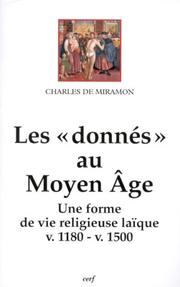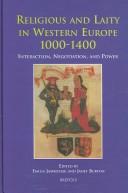| Listing 1 - 4 of 4 |
Sort by
|
Book
ISSN: 17656095 ISBN: 9782711624942 2711624943 Year: 2013 Publisher: Paris: Vrin,
Abstract | Keywords | Export | Availability | Bookmark
 Loading...
Loading...Choose an application
- Reference Manager
- EndNote
- RefWorks (Direct export to RefWorks)
Les querelles médiévales qui opposèrent les défenseurs du pouvoir laïque à la Papauté ont été étudiées par les historiens de la pensée politique. Mais on ne saurait y réduire la question des rapports de la laïcité et de la philosophie à cette époque. À l'âge de la scolastique, l'Eglise exerce aussi un monopole culturel - un fait que l'histoire de la philosophie se doit d'examiner de plus près. Quelle instruction les laïcs reçoivent-ils des clercs et, en regard, comment s'approprient-ils la philosophie? Quelles sont les politiques culturelles et les productions des clercs à destination des laïcs, comment sont-elles reçues par ceux-ci qui prétendent de leur côté aux différents savoirs philosophiques ? Une telle enquête n'est pas qu'historique: elle conduit réflexivement à la définition de la philosophie comme discipline spécifique; définition où la philosophie varie dans ses contenus, ses fins et ses formes, selon les auteur les destinataires supposés et les lecteurs réels.
Laïcat --- Philosophy, Medieval --- Laicism --- Philosophie médiévale --- Laïcité --- History --- Histoire --- Laity --- Catholic Church --- Laïcat --- Philosophie médiévale --- Laïcité --- Philosophie médiévale. --- Laity - Catholic Church - History - To 1500 --- Laity - History
Book
ISBN: 9788833137063 8833137066 Year: 2020 Volume: 19 Publisher: Roma: Viella,
Abstract | Keywords | Export | Availability | Bookmark
 Loading...
Loading...Choose an application
- Reference Manager
- EndNote
- RefWorks (Direct export to RefWorks)
Modus Vivendi is a collection of essays by scholars who seek to discover lay men and women within the projects of reform and renewal in later medieval Europe. Religious life was never without change, yet religious orders, preachers, and institutions of learning proclaimed their desire to make religious life more sincere. In doing so, they occasionally developed a mission to lay people alongside professional religious. Such encounters with the laity – through the writing of theology in the vernacular, in the delivery of charismatic preaching, in the operation of inquisition into heresy, in the composition of new liturgies, and through networks of patronage – created modes of living religion – modus vivendi – of creativity as well as discipline. They contributed to religious life beyond the routine provisions of parish life, and often included women in novel ways.Modus Vivendi spans European regions across the period 1350-1500 in its studies, based on texts, objects, and images which have been little studied so far
Ancient and medieval history --- Religion --- Christian life --- Church history --- Laity --- History --- Catholic Church --- Reformation --- Vie chrétienne --- Église --- Laïcat --- Réforme --- Église catholique --- 27 "04/14" --- 27 "04/14" Histoire de l'Eglise--Middeleeuwen --- 27 "04/14" Kerkgeschiedenis--Middeleeuwen --- Histoire de l'Eglise--Middeleeuwen --- Kerkgeschiedenis--Middeleeuwen --- Christian church history --- anno 500-1499 --- Europe --- Christian life - History - Middle Ages, 600-1500 --- Church history - Middle Ages, 600-1500 --- Laity - Catholic Church - History - To 1500 --- Histoire de l'Église catholique --- Christianisme --- Laïc --- Réforme catholique --- Haut Moyen âge -- 476-987 --- Vie chrétienne --- Église --- Laïcat --- Réforme --- Église catholique

ISBN: 2204061018 9782204061018 Year: 1999 Publisher: Paris: Cerf,
Abstract | Keywords | Export | Availability | Bookmark
 Loading...
Loading...Choose an application
- Reference Manager
- EndNote
- RefWorks (Direct export to RefWorks)
Christian church history --- anno 1200-1799 --- anno 1100-1199 --- Laity --- Christian life --- Spiritual life --- Church history --- Laïcat --- Vie chrétienne --- Vie spirituelle --- Eglise --- Catholic Church --- History --- Eglise catholique --- Histoire --- Monasticism and religious orders --- 27 "04/14" --- -Monasticism and religious orders --- -Monachism --- Monastic orders --- Monasticism and religious orders for men --- Monasticism and religious orders of men --- Orders, Monastic --- Religious orders --- Brotherhoods --- Christian communities --- Brothers (Religious) --- Friars --- Monks --- Superiors, Religious --- Christian laity --- Laymen --- Church polity --- Lay ministry --- Kerkgeschiedenis--Middeleeuwen --- -History --- -Laity --- -Kerkgeschiedenis--Middeleeuwen --- -27 "04/14" --- -Christian church history --- Laïcat --- Vie chrétienne --- -Christian laity --- Monachism --- Orders, Religious --- Monasticism and religious orders - History - Middle Ages, 600-1500. --- Laity - Catholic Church - History - To 1500. --- EUROPE --- EGLISE CATHOLIQUE --- VIE RELIGIEUSE --- MOYEN AGE --- HISTOIRE --- 0600-1500 (MOYEN AGE)

ISBN: 9782503520674 2503520677 9782503537665 Year: 2006 Volume: v. 2 Publisher: Turnhout: Brepols,
Abstract | Keywords | Export | Availability | Bookmark
 Loading...
Loading...Choose an application
- Reference Manager
- EndNote
- RefWorks (Direct export to RefWorks)
This volume examines forms of interaction between monastic or mendicant communities and lay people in the high Middle Ages in Britain, France, the Low Countries, and Scandinavia. The nineteen papers explore these issues in geographically and chronologically diverse settings in a way that no English-language collection has yet attempted. It brings together the latest research from established as well as younger historians. The first section ‘Patrons and Benefactors: power, fashion, and mutual expectations’ examines lay involvement in foundations, the rights held by patrons, and how they used these powers, as well as networks of relationships within broader groups of benefactors. The authors demonstrate how changing fashions shaped the fortunes of particular orders and houses and explore how power relations between different types of patrons and benefactors - royal figures, kinship, and other social groupings - affected the mutual expectations of the various parties. The second section of the volume, entitled ‘Lay and Religious: negotiation, influence, and utility’, shows how lay people’s ideas of the role of religious houses could impact upon their patronage of, and support for, monastic or mendicant institutions. Conversely, religious communities offered multi-faceted benefits - practical, intellectual, or spiritual - for the secular world. The book concludes by focusing on the rapid growth of confraternities, their relation to their urban mendicant and monastic contexts, and how the role and forms of confraternities evolved in the late medieval period.
27 <4> --- 940.17 --- Kerkgeschiedenis--Europa --- Geschiedenis van Europa:--1096-1492 --- 940.17 Geschiedenis van Europa:--1096-1492 --- Benefactors --- Bienfaiteurs --- Laïcat --- Church history --- Laity --- Monasticism and religious orders --- History --- Catholic Church --- Monachism --- Monastic orders --- Monasticism and religious orders for men --- Monasticism and religious orders of men --- Orders, Monastic --- Orders, Religious --- Religious orders --- Brotherhoods --- Christian communities --- Brothers (Religious) --- Friars --- Monks --- Superiors, Religious --- Christian laity --- Laymen --- Church polity --- Lay ministry --- Christianity --- Donors (Benefactors) --- Patrons (Benefactors) --- Persons --- Philanthropists --- Middle Ages, 600-1500 --- Christian church history --- anno 1100-1199 --- anno 1200-1299 --- anno 1300-1399 --- anno 1000-1099 --- Western Europe --- Monachisme et ordres religieux --- Eglise --- Histoire --- Eglise catholique --- Europe --- To 1500 --- England --- Middle Ages, 500-1500 --- Monasticism and religious orders - Europe - History - Middle Ages, 600-1500 --- Benefactors - Europe - History - To 1500 --- Laity - Europe - History - To 1500 --- Laity - Catholic Church - History - To 1500 --- Church history - Middle Ages, 600-1500
| Listing 1 - 4 of 4 |
Sort by
|

 Search
Search Feedback
Feedback About UniCat
About UniCat  Help
Help News
News